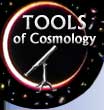
|
|
 |
Comte's
Bad Prediction
|
 |
|
|
|
A poor prediction about the possibilities of science was made in 1835 by the prominent French philosopher Auguste Comte. In his Cours de la Philosophie Positive he wrote:
14 years later, the physicist Gustav Kirchhoff discovered that the chemical composition of a gas could be deduced from the spectrum of its light. This method was later extended to astronomical bodies by astronomers using spectrographs attached to telescopes. |
Copyright ©. Brought to you by the Center for History of Physics, a Division of the American Institute of Physics |
|
|||||